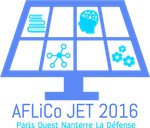Call for papersThe French Cognitive Linguistics Association (AFLiCo) invites you to submit paper proposals for its next workshop (AFLiCo JET 2016). AFLiCo workshops provide a forum for high-quality scientific research in cognitive linguistics and, more generally, usage-based approaches to language. The topic of this year’s conference is “Cognitive Linguistics before and after the empirical turn”. With its original rejection of hypothetical modules of language structure and its focus on language use in all its complexity, first-generation cognitive linguistics is theory-driven (Fillmore, 1982; Lakoff, 1987; Langacker, 1987; Talmy, 2000). Dissatisfied with the practice of using themselves as sole informants, cognitive linguists have now realized the empirical implications of their own theoretical framework and have found empirical methods to be far more useful than introspection to test their hypotheses (Geeraerts, Kristiansen, & Peirsman, 2010; Gibbs, 2007; Gries, to appear; Tummers, Heylen, & Geeraerts, 2005). If language is approached holistically and the structure of meaning is hooked on human experience, one challenge that cognitive linguistics has to address is whether the data-oriented methodology of the approach is in keeping with its theoretical tenets. Here is an open-ended list of topics that the workshop is about:
Cognitive linguistics is at the crossroads of compatible theoretical and methodological paradigms (construction grammar, cognitive grammar, corpus linguistics, gesture studies, language acquisition, language impairments, discourse analysis, sign languages, etc.). All these theories and methods are most welcome, including those frameworks which consider themselves distinct from cognitive linguistics but are close enough to share a good number of tenets (e.g. enunciative linguistics, functional linguistics). Bibliography Fillmore, C. (1982). Frame semantics. In Linguistic Society of Korea (Ed.), Linguistics in the Morning Calm (pp. 111-137). Seoul: Hanshin Publishing Co. Geeraerts, D., Kristiansen, G., & Peirsman, Y. (2010). Advances in Cognitive Sociolinguistics. New York: Mouton de Gruyter. Gibbs, R. W. (2007). Why cognitive linguists should care more about empirical methods. In M. Gonzalez-Marquez, I. Mittelberg, S. Coulson, & M. J. Spivey (Eds.), Methods in Cognitive Linguistics (pp. 2-18). Amsterdam: John Benjamins. Gries, S. T. (2013). Data in Construction Grammar. In G. Trousdale & T. Hoffmann (Eds.), The Oxford Handbook of Construction Grammar (pp. 93-108). Oxford: Oxford University Press. Lakoff, G. (1987). Women, Fire, and Dangerous Things: University Of Chicago Press. Langacker, R. W. (1987). Foundations of cognitive grammar (Vol. 1). Stanford, CA: Stanford University Press. Talmy, L. (2000). Toward a cognitive semantics (Vol. 1). Cambridge, Mass. ; London: MIT. Tummers, J., Heylen, K., & Geeraerts, D. (2005). Usage-based approaches in Cognitive Linguistics: A technical state of the art. Corpus Linguistics and Linguistic Theory, 1(2), 225-261. |


